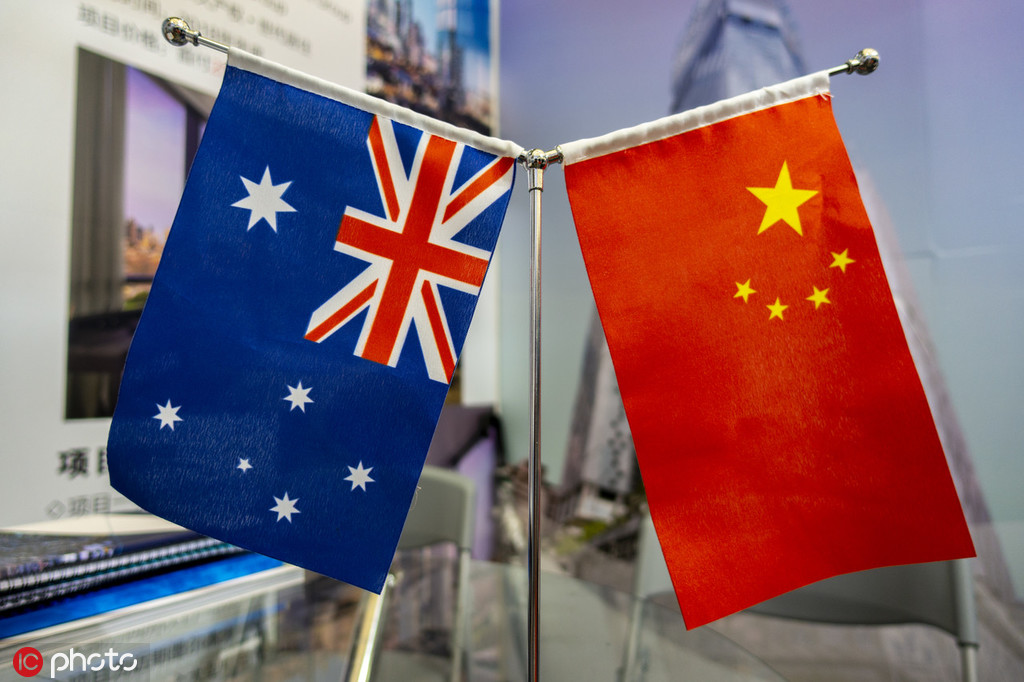Australia must make sincere efforts to improve ties
By Xu Shanpin | China Daily | Updated: 2019-12-17 07:51

Growing global economic uncertainties have added fuel to the "China infiltrating Australia" and "China threat" fallacies in Australia. Despite these facts, after winning the general election in May, Prime Minister Scott Morrison of the Liberal Party has made efforts to mend Sino-Australian relations, which have been deteriorating since 2017 because of the Liberal Party hyping up the "China threat" fallacy to garner popular support.
To improve Sino-Australian relations, the Morrison government established the National Foundation for Australia-China Relations replacing the 40-year-old Australia-China Council. Also, China and Australia reached a consensus to repair bilateral ties and protect mutual interests at a meeting between Chinese Premier Li Keqiang and Morrison on the sidelines of the Regional Comprehensive Economic Cooperation conference in Thailand on Nov 3.
Still, Sino-Australian relations are likely to suffer setbacks in the future given the Australia-United States security alliance and the US' interference in regional and other countries' internal affairs, the trade frictions between Beijing and Washington, and rising populism in many economies.
Beijing-Canberra relations have already suffered a serious blow this year due to allegations that China was spying on Australia using Chinese students as tools and interfering in Australian politics and elections.
Although the Australian government has not cited any specific target of the Australian Security Intelligence Organization-led anti-espionage operation it launched on Dec 2 and the parliamentary inquiry it started on Dec 5 into potential foreign interference through social media platforms such as Facebook, Twitter and WeChat, it is widely believed they are driven by concerns over "Chinese infiltration".
In trying to strike a balance between its close security ally, the US, and one of its biggest trading partners, China, Australia has increased its vigilance against China to a level not seen even in the US. As its limited market and to some extent stagnant economy, Australia is more likely to be worried about its economic dependence on a rising China. That the US-Australia alliance plays a big role in fueling that worry goes without saying.
Moreover, the ethnic bias among many Australians, along with rising numbers of overseas Chinese students and businesspeople, and Chinese-Australians' increasing voice in the country's politics have fueled doubts about China's increasing influence in the region. In fact, some Australian conservative politicians have used the imaginary threat of China and Chinese interference in Australian politics to accumulate popular votes.
All this has had a huge impact on Sino-Australian relations, especially bilateral trade. For example, a report jointly prepared by KPMG and the University of Sydney says that "Chinese investment in Australia declined by 37.6 percent from $10 billion in 2017 to $6.2 billion in 2018" and "the rate of decline has accelerated since 2017".
So, against the backdrop of geopolitics outweighing trade relations, it might be difficult for Canberra to strike the right diplomatic balance between its ties with Washington and Beijing in the near future. If the imbalance increases, it will make Australia less flexible in terms of diplomacy.
If Canberra is sincere about improving relations with China, it should make more concrete efforts in that direction. China, on its part, will continue to work for peaceful development in order to protect mutual interests and produce mutual benefits.
And if Australia does not mix geopolitical and territorial conflicts with bilateral ties, and promotes its comprehensive strategic partnership with China, the two sides can explore common grounds to establish win-win cooperation for mutual benefits.
The author is an adjunct researcher at the Center for Australia Studies, China University of Mining and Technology. The views don't necessarily represent those of China Daily.























